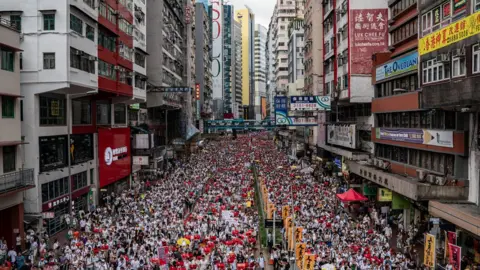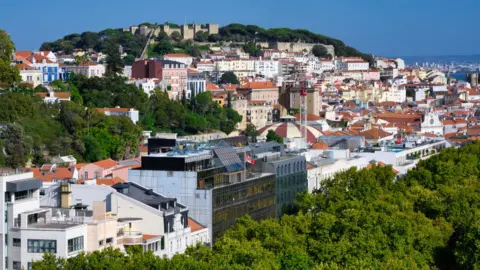Hong Kong protests: Rich chase golden visas as unrest simmers
Wealthy Hong Kong citizens are increasingly on the hunt for new passports as protests drag on and cast a cloud over the territory's future.
Many countries run "golden visa" schemes that offer resident or citizenship rights in exchange for sizeable investments.
Several migration firms have reported a spike in interest from Hong Kong for these visas since the unrest began.
They say with no resolution in sight, residents are seeking "insurance".
Protests in the territory began in June, sparked by a proposed law that would have allowed extradition from Hong Kong to the Chinese mainland.
Despite the bill being withdrawn, demonstrations have continue to rock the city for months and show no immediate sign of abating.
Against that backdrop, various immigration agencies told the BBC they have seen a sharp rise in interest from Hong Kong residents in investor visa schemes.
 Getty Images
Getty ImagesThese programmes exist all over the world, with Europe and the Caribbean particular hubs. Typically, countries require the purchase of property, government bonds or a set donation to secure a visa.
The minimum investment varies greatly - from a $100,000 (£81,200) donation in Antigua & Barbuda, to around €2m (£1.8m) in real estate investment for Cyprus.
Buying 'insurance'
Hong Kong-based John Hu Migration Consulting has seen a four-fold increase in sales and inquiries from locals about golden visa schemes since June.
Founder John Hu said recent unrest in the former British colony had been the "catalyst" for the rush.
"As the protests become more violent and it seems that the government is not doing much to resolve the current situation, they have the urgency to buy insurance," he said.
Enticed by the freedom of movement within the EU and minimal residency requirements, Mr Hu said most are drawn to European schemes including Ireland, Portugal and Malta.
The firm has carried out more than 30 new golden visa applications for Ireland since the protests began, requiring a minimum donation of €500,000 or €1m euros invested into an Irish enterprise.
Another immigration consultancy, Arton Capital, says inquiries from the territory have "more than doubled since the protests started".
"Portugal is very much in favour in Hong Kong because of the relatively cheap real estate… real estate prices in Hong Kong are sky high," according to Philippe May, head of Asia Pacific for Arton Capital.
Mr May said that while clients do not share their reasons for interest in the schemes, "it is very obvious that it is the most recent developments in Hong Kong which caused them to look again at their Plan B".
Overall take-up of golden visas schemes remains small - Arton Capital processes up to 1,000 applications each year - as they target only the wealthy.
Still, Hong Kong has plenty of eligible candidates. The Asian financial hub is a hotbed for the rich, and was home to 179,000 millionaires in 2018 according to Credit Suisse.
Hong Kong ranked 15th in the investment bank's latest list of countries with the most ultra-high net worth individuals.
 Getty Images
Getty ImagesProtests in Hong Kong are not the only factor luring residents to golden visa schemes.
Advisory firm Henley & Partners has also seen a jump in Hong Kong-based inquiries into investor visa programmes since the outbreak of unrest in June.
The firm's public relations director, Paddy Blewer, said the spike comes "as the protests in the city escalate, and as uncertainty about the future persists".
"Compared to last quarter... there has been a 260% rise in interest from Chinese nationals or investors resident in Hong Kong."
But, he adds, domestic issues are only part of the story.
Many Hong Kong clients seek out residency or citizenship schemes for the same reasons any other applicant would, Mr Blewer said, such as opportunities to travel, invest in another country or study abroad.
"They are looking to access finance, they're looking to invest wherever they want, live wherever they want.
"They want their children to go to other universities... to access the rest of the world."
